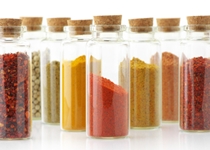 Your home is your temple. But what happens when you start to forget where things are in your temple, such as your TV remote or your keys? What if you’re also unable to perform simple household tasks, like doing your laundry, washing the dishes, or gardening? Do these scenarios sound familiar? Well, for many people, these are the first signs of Alzheimer’s disease. Luckily, your temple—your spice cabinet, in particular—could contain the answer you’re looking for to fight back against dementia.
Your home is your temple. But what happens when you start to forget where things are in your temple, such as your TV remote or your keys? What if you’re also unable to perform simple household tasks, like doing your laundry, washing the dishes, or gardening? Do these scenarios sound familiar? Well, for many people, these are the first signs of Alzheimer’s disease. Luckily, your temple—your spice cabinet, in particular—could contain the answer you’re looking for to fight back against dementia.
You are retired and over the age of 65. You want to enjoy your golden years, play with your grandkids, and do things that matter to you. I get it. You definitely wish you could perform the activities that make your home—well, your home. Countless scenarios are far too common in the U.S., with 5.2 million people diagnosed with Alzheimer’s disease, making it the most common form of dementia.
In your home, there are likely two cabinets: the medicine cabinet, and the pantry or spice cabinet. You open the door of the medicine cabinet, and maybe it contains drugs for Alzheimer’s disease, such as donepezil, memantine, rivastigmine, and galantamine. Your Alzheimer’s disease may temporarily be relieved after taking them; however, these drugs can lead to numerous side effects, such as diarrhea, nausea, vomiting, confusion, and headaches. Donepezil is also known to induce seizures and cause arrhythmia.
So, let’s close the medicine cabinet for now and open the spice and herb cabinet instead. It’s a lot safer in there.
Turmeric: The Ultimate Alzheimer’s-Fighting Spice
The major spice you’ll hear about for the prevention and treatment of Alzheimer’s disease is turmeric, which contains the powerful polyphenol curcumin. Turmeric has been used therapeutically for more than 5,000 years—and for good reason.
I remember an incredible study published in 2012 in the journal Ayu. The small 12-week study suggested that the behavioral symptoms of Alzheimer’s disease could significantly improve with a 764-milligram (mg) treatment of turmeric daily, which equals 100 mg of curcumin.
The study initially observed the severe cognitive decline and psychological and behavioral symptoms of three patients with Alzheimer’s disease. All three patients showed signs of anxiety, apathy, agitation, and irritability. Two of them also had urinary incontinence. They all received turmeric powder capsules, and they began to recover from these symptoms immediately without any side effects. After three months of treatment, there was even less of a burden on their caregivers; after a year of treatment, they were able to recognize their families!
Turmeric is simply an incredible spice. It is also known to treat a multitude of other conditions, such as inflammation and arthritis, heavy metal toxicity, inflammatory bowel disease, and cystic fibrosis. It can also prevent and treat cancer! Turmeric’s golden color definitely reflects its value.
But there are likely more incredible Alzheimer’s-fighting herbs and spices in your cabinet than just turmeric.
Other Herbs and Spices for Fighting Dementia
What else from the spice and herb cabinet can help your Alzheimer’s disease symptoms? Other effective herbs for mild to moderate Alzheimer’s disease include sage, lemon balm (Melissa offinalis), and Gingko biloba.
Saffron is another popular Indian spice known to help reduce the symptoms of Alzheimer’s disease. In a randomized, multi-center, double-bind, controlled study, researchers found that saffron capsules treated mild to moderate Alzheimer’s disease. The study observed 54 Alzheimer’s disease patients, aged 55 years and older. The patients received 10 mg of donepezil or 30 mg of saffron daily for the 22-week period. The spice produced similar anti-Alzheimer’s results when compared to the drug.
Alzheimer’s-Fighting Foods
You can also consider other foods for lowering your risk of Alzheimer’s disease and fighting back against dementia symptoms. Consider adding some of the following foods to your regular diet to see the most benefits:
- Coconut oil
- Foods high in B vitamins, especially folate (vitamin B9), including: collard greens, spinach, broccoli, or cauliflower
- Foods containing the compound resveratrol, including: almonds, grapes, and chocolate
Sources for Today’s Article:
Ji., S., “Turmeric Produces ‘Remarkable’ Recovery in Alzheimer’s Patients,” GreenMedInfo web site, June 10, 2013; http://www.greenmedinfo.com/blog/turmeric-produces-remarkable-recovery-alzheimers-patients, last accessed December 5, 2014.
Akhondzadeh, S., et al., “A 22-week, multicenter, randomized, double-blind controlled trial of Crocus sativus in the treatment of mild-to-moderate Alzheimer’s disease,” Psychopharmacology January 2010; 207(4): 637–643, doi: 10.1007/s00213-009-1706-1.
Ji., S., “Declaring Chemical Warfare Against Alzheimer’s,” GreenMedInfo web site, June 28, 2012; http://www.greenmedinfo.com/blog/declaring-chemical-warfare-against-alzheimers1, last accessed December 5, 14.
Hishikawa, N., et al., “Effects of turmeric on Alzheimer’s disease with behavioral and psychological symptoms of dementia,” Ayu October 2012; 33(4): 499–504, doi: 10.4103/0974-8520.110524.
“Turmeric,” The World’s Healthiest Foods web site; http://www.whfoods.com/genpage.php?tname=foodspice&dbid=78, last accessed October 30, 2014.
